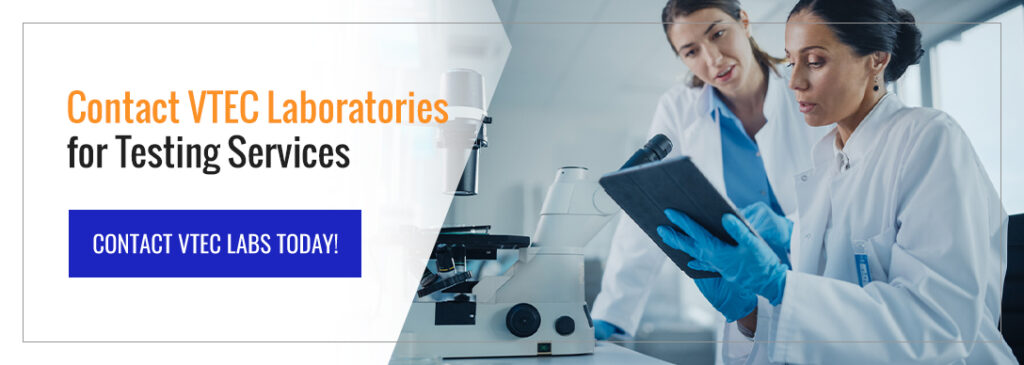The Importance of ISO 17020 Lab Accreditation
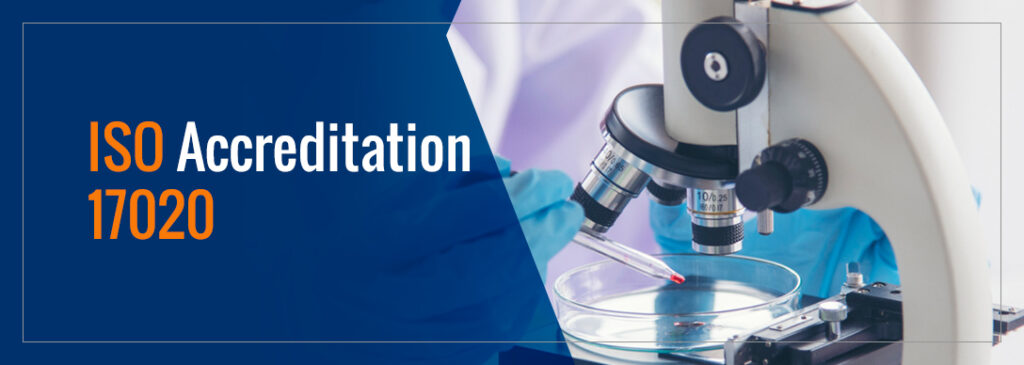
The International Organization for Standardization develops international standards, some of which are specific and strict regulations inspection bodies must follow to obtain ISO accreditation. These standards ensure organizations perform evaluations safely and accurately.
The ISO 17020 standard assesses organizations’ qualifications, integrity and ability to complete unbiased reviews. ISO 17020 compliance provides an inspection body with global recognition for their competence and ability to perform quality inspections to deliver reliable, accurate results. Understanding the importance of ISO 17020 accreditation is essential because it significantly impacts clients’ and customers’ confidence in products, processes and services.
What Is the ISO 17020 Standard?
Inspection bodies that test the reliability and quality of products and services also need to meet certification standards to correctly perform inspections. They must meet specifications that prove their ability to complete inspections safely and accurately. The ISO 17020 standard is a critical compliance requirement for inspection bodies. ISO 17020 accreditation ensures organizations maintain impartiality and consistency in their operations.
Third parties must evaluate inspection bodies to determine if they are compliant with ISO 17020 standards before they can earn ISO 17020 accreditation. To achieve this accreditation, they must meet requirements in multiple areas of their structures and procedures.
ISO 17020 Requirements
The ISO 17020 standard requires inspection bodies to meet strict expectations to earn accreditation. To become an ISO 17020-accredited lab, an organization must adhere to the following regulations and requirements.
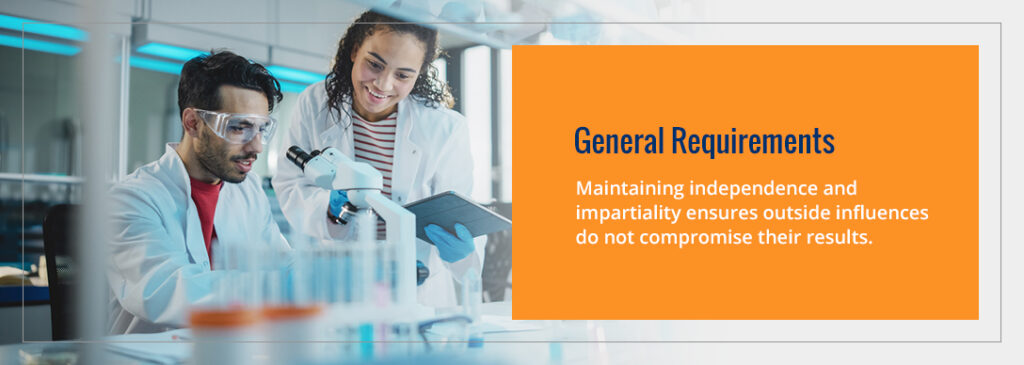
General Requirements
ISO accredited labs must comply with general regulations. Maintaining independence and impartiality ensures outside influences do not compromise their results. They must also stay confidential and keep product and service results private. These requirements are paramount because they help labs maintain reputations as being trustworthy.
Structural Requirements
To earn ISO 17020 accreditation, labs must meet structural regulations, including administrative needs, management requirements and organizational aspects. An inspection body needs documentation that describes its competency in specific activities. It should also obtain provisions such as reserves or insurance to cover potential liabilities that could arise from its operations. These provisions must be equivalent to the nature and level of the organization’s potential liabilities.
ISO 17020-accredited organizations must provide documentation detailing the contractual conditions of their activities and inspections, plus job descriptions including each employee’s responsibilities, duties and authorities. Additionally, the ISO 17020 standard requires inspection bodies to provide documentation that describes their reporting structure and responsibilities.
Each inspection body must have one or more technical managers who oversee inspection activities and ensure their team adheres to international standards in all actions. This person does not have to hold a technical manager title, but they need experience and technical competency in inspection operations. If the organization has more than one person in this position, it should document each person’s specific responsibilities.
Inspection bodies require one or more deputies who take responsibility for overseeing inspection responsibilities when technical managers are unavailable.
Resource Requirements
The ISO 17020 standard requires an inspection body to define and document each employee’s competency and prerequisites. This standard applies to all personnel involved in the inspection process, and it includes requirements in the following areas:
- Training
- Education
- Skills
- Experience
- Technical knowledge
Each employee should be knowledgeable about the following aspects of the products or services they inspect:
- The processes used to make the products and how the technology works
- Process operations
- Delivery of services and potential deficiencies in service delivery
- Potential defects that may occur when consumers use the product
- Any failures in the operation process
Inspection bodies must also document the following procedures:
- Selecting inspection personnel
- Training procedures, including ongoing education
- Formally authorizing personnel
- Monitoring personnel involved in the inspection process
To earn ISO 17020 accreditation, inspection bodies must create and enforce rules for access to and use of equipment and facilities. They should maintain equipment according to documented instructions and procedures, and they must consistently calibrate equipment if it significantly influences inspection results. Additionally, inspection bodies must develop and follow procedures for selecting and approving suppliers, verifying incoming goods and services and ensuring appropriate storage space.
The ISO 17020 accreditation requires inspection bodies to ensure any automated equipment, such as computers and other technology, is adequate for use. They have procedures that make sure their technology protects data and functions properly. They must also have the following:
- Documented procedures for handling defective equipment
- Recorded information about equipment and software
- Documented calibration and maintenance information
- Documented proof that any subcontractors for the organization are competent and adhere to international standards
Process Requirements
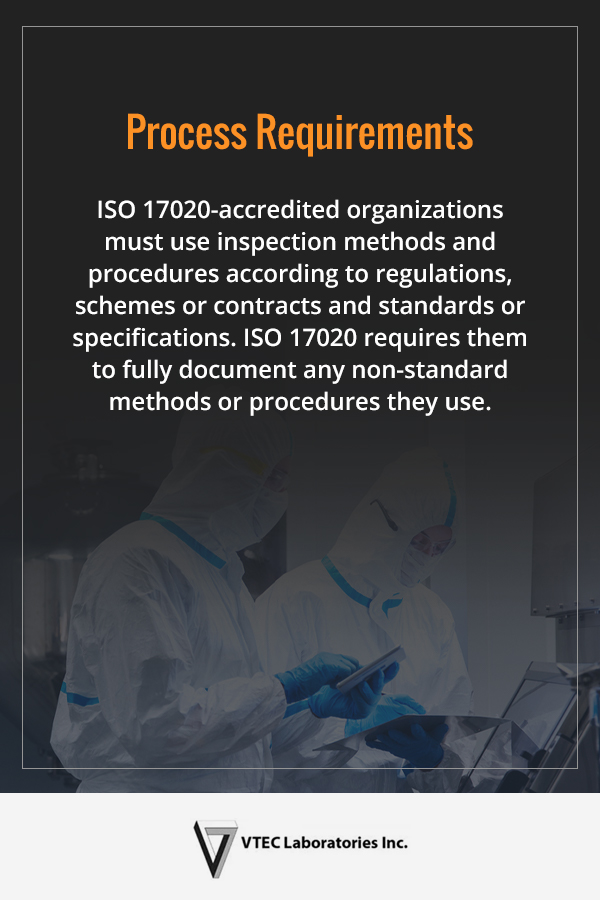
ISO 17020-accredited organizations must use inspection methods and procedures according to regulations, schemes or
contracts and standards or specifications. ISO 17020 requires them to fully document any non-standard methods or procedures they use. It also demands organizations do the following:
- Make sure they have adequate resources to meet client requirements before undertaking work.
- Adequately define client needs so personnel can receive unambiguous instructions.
- Conduct regular reviews and corrective action to control the work of inspection personnel.
- Meet work order or contract requirements.
- Uniquely identify samples to avoid sample identity confusion and properly notice any abnormalities.
- Document procedures to avoid damaging or deteriorating products during the inspection.
- Maintain a record system that includes detailed reports and enables inspection evaluations.
- Document a process for receiving, evaluating and making decisions about appeals and complaints.
Management System Requirements
The ISO 17020 standard requires an organization’s top management to determine, document and maintain objectives and policies. Management should ensure all levels of the organization acknowledge and implement the documented objectives and policies. Top management personnel must also appoint a lower member of management to maintain processes and procedures and report performance to top management.
In addition to these responsibilities, management should also do the following:
- Establish procedures to control internal and external documents.
- Retrieve, identify, store, protect, retain and dispose of documents according to international standards.
- Implement processes to review the management system at scheduled intervals.
- Establish internal audits to occur at least once a year.
- Determine appropriate corrective actions the organization can take in the event of potential nonconformities.
- Create preventive action measures to eliminate nonconformity causes.
Difference Between ISO 17020 Accreditation and ISO 17025 Accreditation
While the ISO 17020 standard and the ISO 17025 standard may seem similar, they are different. ISO 17020 applies to inspection organizations. ISO 17025 applies to test and calibration organizations. Inspection bodies only determine conformity in terms of “pass” or “fail,” while test and calibration organizations confirm measurement accuracies.
Since these two test methods apply different procedures and cultivate different types of results, they must adhere to different standards unique to their processes.
The Benefits of Being an ISO 17020-Accredited Lab
Obtaining ISO 17020 accreditation comes with many requirements and regulations that organizations must adhere to. Its strict standards require inspection bodies to meet expectations in various areas such as management, facilities, equipment, processes and safety. These can become time-consuming, but they are also significantly beneficial. ISO 17020 is an excellent accreditation to have because it comes with the following benefits.
1. Increased Competency
Labs that earn the ISO 17020 certification increase their competency in the inspection process. The ISO 17020 certification ensures that they use the appropriate equipment and methods to correctly perform tests and inspections. It allows them to effectively assure quality in the procedures they conduct, and it ensures they perform confidential, impartial inspections. Labs with the ISO 17020 accreditation also operate with effective work safety processes and code of conduct measures.
2. International Compliance and Reputation
The ISO 17020 accreditation ensures testing labs comply with international standards. As a result, ISO 17020-accredited labs maintain international reputations as organizations that meet global expectations, which allows them to deliver results for national and international customers.
3. Reliability
Clients can rely on ISO 17020-accredited labs to meet their needs and deliver accurate results, which creates greater customer confidence. An ISO 17020-accredited lab increases its customers’ satisfaction by reducing the need for additional assessments.
When a lab earns the ISO 17020 accreditation, it becomes a reliable organization people know they can trust. Customers can rest assured knowing a lab evaluated by an independent third party has tested their products or services, which allows them to save money and time.
4. Competitive Advantage
ISO 17020-accredited inspection bodies can develop a significant competitive market advantage. The ISO 17020 accreditation allows a lab to demonstrate its competency and hold an international reputation as a reliable organization, which places it a step ahead of competitors. This advantage allows accredited organizations to serve more customers with confidence and consistency.
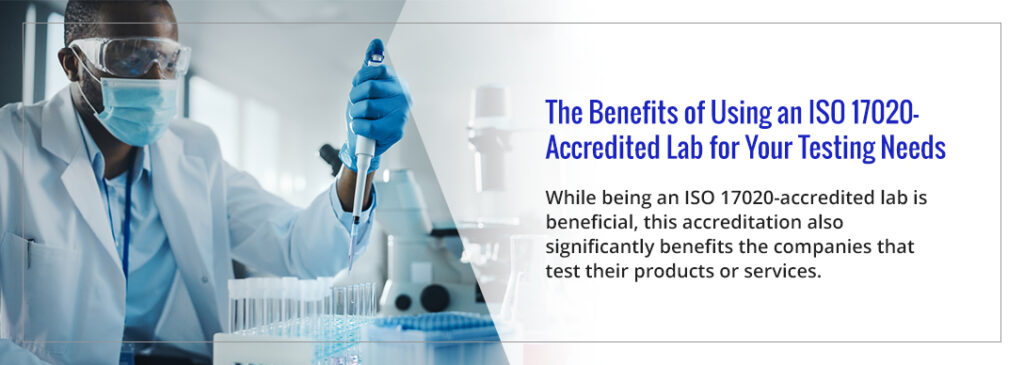
The Benefits of Using an ISO 17020-Accredited Lab for Your Testing Needs
While being an ISO 17020-accredited lab is beneficial, this accreditation also significantly benefits the companies that test their products or services. When you work with an ISO 17020-accredited lab, you can enjoy the following advantages.
1. Quality Testing Environment and Equipment
ISO 17020-accredited labs consistently test and maintain their equipment and facilities. Their laboratory resources must meet or exceed international standards. When you have your products or services inspected with high-quality equipment, you can trust that the results will have little to no errors.
2. Competent Inspectors
Having your products or services inspected by an ISO 17020-accredited lab means knowledgeable and experienced people test your products, processes and services. You can be confident that they meet or exceed international inspection standards.
3. Valid Results
You can expect valid results from competent, ISO 17020-accredited inspectors. Accredited labs achieve accurate results by maintaining quality control measures and thorough processes. They will provide detailed reports that include any nonconformities, so you know where to make changes if needed. With an ISO 17020-accredited lab, you can rest assured that you are receiving accurate results.
4. Saving Time and Money
Since an ISO 17020-accredited lab delivers accurate results you can trust, it decreases your chances of needing to retest your products, processes and services. An accredited lab will perform the correct testing procedures to ensure reliable results the first time, saving you time and money on retesting services.
5. Confidentiality and Safety
ISO 17020-accredited labs also ensure that your information and results remain safe and confidential. They adhere to international standards, which require them to deliver independent and unbiased results free from outside influences. An accredited lab will ensure their processes, technology and documentation keep your information safe and secure.
6. Customer Confidence
The ISO 17020 standard has earned global recognition. Your clients and customers will be more likely to trust your products and services when they know an accredited lab has tested for quality and reliability. Working with a certified lab gives your current and potential customers increased confidence in what you provide for them, so it’s an excellent way to build your reputation, satisfy customers and increase your client base.
Is VTEC Laboratories ISO Accredited?
Working with an ISO 17020-accredited lab ensures you receive accurate, reliable testing results and increase your customers’ confidence and satisfaction in your products and services. Allow VTEC Laboratories to conduct your product, process and service testing to work with an internationally recognized organization that adheres to global standards. VTEC Laboratories is ISO accredited in the ISO 17020 standard as well as the following standards.
ISO 17025 Accreditation
ISO 17025 accreditation specifically qualifies calibration laboratories to perform sampling, calibration and product testing. An ISO 17025 lab meets international standards for validity and operational competence. It includes guidelines for quality management, accuracy, effective testing, procedures and resources.
Labs with ISO 17025 accreditation must consistently meet regulations and guideline updates. VTEC Laboratories is ISO 17025 accredited and qualified to provide testing and calibration services that meet international guidelines.
ISO 17065 Accreditation
VTEC Laboratories is also ISO 17065 accredited. The ISO 17065 standard qualifies organizations to certify product, process and service quality for various companies. It proves that a lab is productive, efficient, competent and effective in its operations. Similar to other accreditations, labs must keep up with guideline updates and continuously meet standards.
Contact VTEC Laboratories for Testing Services
ISO accreditation qualifies an organization to accurately and efficiently test products or services so customers can trust your company and receive what they expect. When you work with an ISO 17020-accredited lab, you can expect accurate results and build your reputation as a company that complies with international standards.
VTEC Laboratories is a leading international commercial and testing service for various industries. With ISO accreditation and the ability to conduct a wide range of tests, we can deliver accurate results to certify your products or services. Contact VTEC Laboratories to learn more about our testing and certification services.

